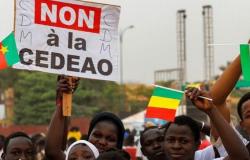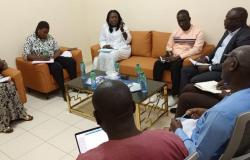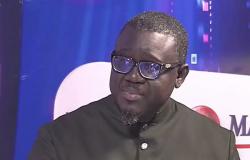Police patrol an empty and cordoned off Christmas market, where a car crashed into a crowd, early on December 21, 2024, in Magdeburg, eastern Germany. At least one person was killed and 68 others injured on December 20, 2024 in what is suspected to be an attack on a Christmas market in the city of Magdeburg, according to local authorities. (Photo by John MACDOUGALL / AFP)
AFP
The trail of an Islamist attack thus seems to be receding, even if the reasons for the act remain mysterious.
Coming to meditate on the scene with several ministers including Ms. Faeser, Olaf Scholz launched an appeal for national cohesion after the “crazy” attack of which the 50-year-old alleged perpetrator, living in Germany since 2006, was arrested on Friday shortly after the carnage.
The German Chancellor promised in this context “to act against those who want to sow hatred”.
He called on Germans to “stick together” after a “terrible”, “crazy” act and a “catastrophe” for the entire country, while the far-right Alternative for Germany (AfD) has already seized on the attack to denounce the reception of foreigners and refugees in the country.
“When will this madness end?”, wrote AfD co-president Alice Weidel on the X network, whose party is credited with second place in the polls, at almost 20%, with a view legislative elections at the end of February.
Psychological problems? another motivation? The reasons of the alleged perpetrator of the carnage, who distinguished himself with conspiratorial and anti-Islam comments on social networks, remain unclear.
“We must precisely understand the perpetrator, his actions and his motivations and then draw legal consequences,” Olaf Scholz said.
The toll rose on Saturday from 2 to 5 dead and more than 200 injured, said the head of the regional government, Reiner Haseloff. But it is only very provisional because, according to Olaf Scholz, 40 people suffered injuries of such seriousness “that we can be worried” about them.
Around 7:00 p.m. (6:00 p.m. GMT) on Friday, a powerful BMW car suddenly rushed into the aisles of the Christmas market, mowing down visitors one by one in its path over some 400 meters.
Dressed in black, Mr. Scholz placed flowers on Saturday in front of the church, opposite the scene of the tragedy. Many anonymous people preceded him, leaving bouquets and candles, to bear witness to the fear which froze the country a few days before Christmas and in the middle of the electoral campaign.
The attack came eight years almost to the day after a similar act committed at a Berlin Christmas market. But as it stands, the authorities seem to rule out an Islamist act such as that committed in Berlin in 2016.
Because the profile of the alleged perpetrator, Taleb Jawad H. Al Abdulmohsen, arrested next to the ram car, raises many questions. This doctor worked as a psychiatrist in a small town not far from Magdeburg where he had refugee status.
Far from sympathizing with the jihadist movement, he had on the contrary made himself known for years through his frequent positions on social networks against Islam. He said he felt persecuted by denouncing the “dangers” of an Islamization of Germany for which Berlin would be co-responsible.
The man first made himself known in the community of Saudi immigrants in Germany by helping asylum seekers, particularly women, before sympathizing more recently with the positions of the AfD or Elon Musk. “In the current state of the investigation it is not yet possible to categorize what happened at the Christmas market,” local police said.
Among the people, sometimes in tears, gathered on the porch of the Johanneskirche church, Michael Raarig, a 67-year-old retired engineer, said he was “sad and shocked”. “I never thought it was possible here,” he emphasizes.
Several passersby expressed their anger at the German government and the country's welcoming of foreigners. “Talk with the AfD!”, an onlooker told the chancellor during a meditation near the church.
“When so many people come to us, we also have to look a little closer. We now pay the bill,” Michael Raarig also judged.
Others are much more measured. “We are overwhelmed, speechless and we tell ourselves that we could have been there at that moment,” confides Harm Boems, a young 19-year-old student, with tears in his eyes. For him, it is important “to concentrate for a few hours, for a few days (…) on the victims, the people who suffered”. “Maybe policies at the federal level are somehow responsible,” he conceives. But he emphasizes that security measures had been taken to protect this very popular market during the holidays, where families came to taste gingerbread, sausages, and drink mulled wine in the middle of small illuminated chalets selling artisanal products.
“It is very important not to let politicians exploit this attack,” warns German-American Knut Panknin, who laid a wreath with his African-American companion. “Politicians must be concerned about security and order but at the same time, they must not abandon the field to populists,” adds this fifty-year-old, who lives in Washington and came to spend the end of year holidays in his family in Germany. And he recalls: “the majority of crimes in Germany are committed by German citizens”.






